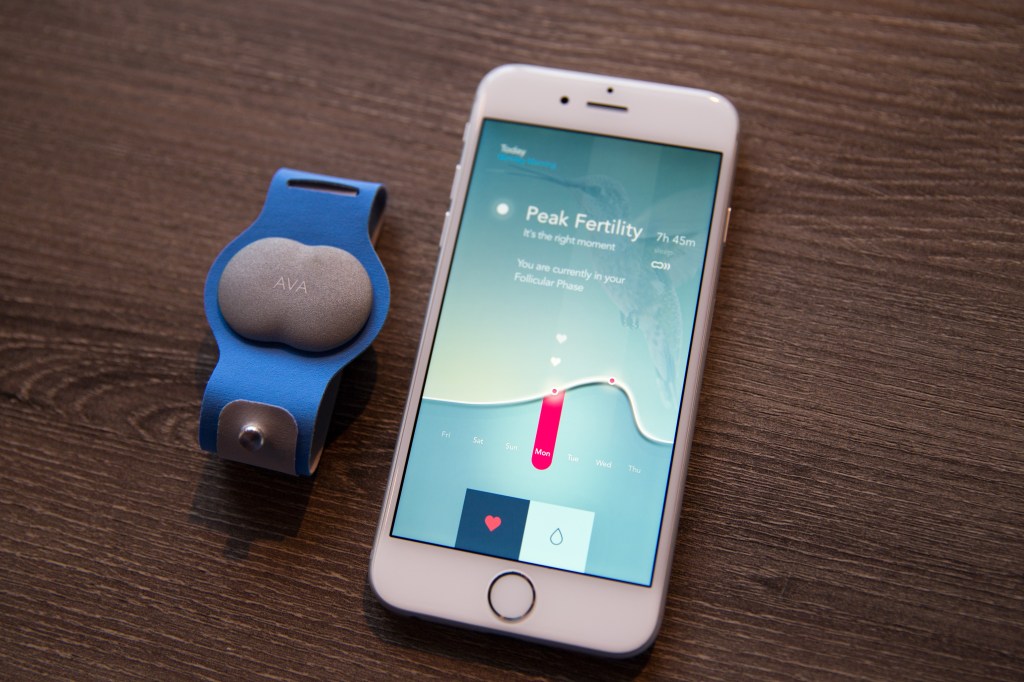As the worlds of health and technology continue to knit closer together through advances in hardware and big data analytics, a startup called Ava, which has built a $199 $249 wearable device and app to help women track their fertility cycles, has raised $30 million to expand into other aspects of female health.
The funding — led by unnamed existing investors plus new backers btov and SVC — comes at a time of fast growth for the company. Ava says it has now enabled 10,000 pregnancies, or “Ava babies” as they have sometimes been called. As a point of reference, in late 2016, around when the company — founded in Zurich and now co-based also in San Francisco — had raised a Series A round of $9.7 million, the company had tracked only 7 Ava babies due in 2017.
Lea von Bidder, Ava’s CEO and co-founder holding down the fort in SF (her co-founders Pascal Koenig, Peter Stein, and Philipp Tholen are based in Zurich) says that the company is not disclosing its valuation with this round. It brings the total raised by the company to $42.3 million since 2014 (showing off its device for the first time as part of our Battlefield competition in 2015), with previous investors including Khosla Ventures, Swisscom, DCM and more.
For some more context, other leading fertility startups (coincidentally also out of Europe) Clue and Natural Cycles have raised $30 million and $37.5 million respectively.
While Clue and Natural Cycles have focused on software — specifically, apps that track different markers that are either collected by the user inputting information directly, or by way of tapping diagnostics from other wearables (Clue, for example, has a Fitbit integration) — Ava’s unique selling point has been how it has married hardware development with advanced analytical software to read multiple diagnostics from its wearable and to use those analytics to help draw conclusions about what a woman’s body is doing.
“Everything we do is artificial intelligence,” Von Bidder said of the analytics part. “We are clearly an AI company in the end. It’s just a fancy term for big data analytics and that is exactly what we do. When you think about what Ava does, we are measuring your body and understanding it, and the only way we could do that is with AI.”
Building a wearable can pose many challenges in the form of manufacturing, capital outlay, and simply getting people to buy them — hardware, as the tech world likes to say, is indeed hard. But when a company gets it right, building a vertically integrated business that brings in both together can prove to be a compelling business.
In the case of Ava, all the measurements — there are nine diagnostics being collected, including heartrate, body fat, heat loss, and sleep movement, all of which are lined up with indicators of other physiological changes — are taken while a person is sleeping every night, removing some of the possibility for human error in the collection phase. And when you consider that many of the current products to measure your fertility are based either on a thermometer or a urine test, a wristband you need to remember to slip on at night might seem like a significantly cleaner and easier alternative.
While Ava continues to build out its existing operations, the bigger picture, Von Bidder said, is the company’s plans for where it plans to take its business next.
Today, the company’s “sweet spot” for customers are women who are trying to conceive a child but have not been immediately successful, yet have not yet passed the one-year mark of trying, which is typically when those women might start to turn to medical help to get pregnant.
Ava is currently running a host of clinical trials not only to extend the kind of help it can offer other categories of women who want to get pregnant — for example those with pre-existing complications, and those who have been trying for more than a year — but also women who might not want to get pregnant at all. That is, helping with contraception, or with other phases of women’s reproductive health, such as menopause.
“The overall vision of the app is to become a companion for all of a woman’s different life stages, including trying to prevent pregnancy and menopause,” said Von Bidder.
A large part of the investment being announced today will be going funding more clinical trials, which are based at the University Hospital of Zurich with Professor Brigitte Leeners and cover areas like fertility challenges and pregnancy complications (which itself is another huge area, and leads Ava into one of the least understood aspects of pregnancy: miscarriage, especially those that happen in the first trimester). Other parts of the investment will be used to help fund the other very complex part of being a medical startup, which is navigating regulatory approvals after the trials have been completed, in order to build new products. (This part is overseen by the company’s chief medical officer, Dr Maureen Cronin, is a vet of Bayer Schering, one of the world’s biggest contraceptive companies.)
“It’s exciting to work with a company that is literally reshaping the way we think about menstrual cycles, hormones and women’s health,” said Prof. Leeners in a statement. “Combining the best in science, data insights and technology is not only helping to create families, but improving women’s lives around the world.”































Comment